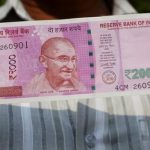
“The Indian government’s clumsiness in banning R500 and R1,000 notes is certain to lead to an economic and financial crisis. Looking on the bright side, it might lead to the collapse of the Modi government. If that happens, it may delay the same medicine being dispensed by other governments to nations in a similar state of development and tempted to pursue similar objectives .. The expected gains to the state are obvious, and one can see why politicians will favor the deployment of financial technology, such as mobile banking, to achieve these ends .. It appears all countries are going down this digital route .. What’s particularly concerning for the individual is the way nations appear to be ganging up together into an unelected unaccountable super-state .. We are already used to the state controlling the interest we pay and receive on our money. Banning cash increases the depth of this control, with savings and deposits being taxed through negative interest rates. The super-state’s cabal of central banks coordinates managed interest rate policies, either by liaising directly, or through the forum of the Bank for International Settlements. Quantitative easing, the direct control of bond prices through central bank purchases, reduces the risk that the market will challenge central bank policies, at least for the short-term .. Eventually, governments will destroy themselves following these political and economic policies, because the states and their experts delude themselves that they understand economics. They do not wish to understand the reasons why markets free of government interference lead to prosperity, and why government micro-management always ends in tears. Consequently, they do not see the risk to statist domination, because it comes not from private individuals, but from the states themselves. Banning cash will almost certainly speed up the decline of an electronic currency’s purchasing power, because its public rejection has the potential to become instantaneous .. Just watch how the cashless rupee behaves. Compare the potential for price inflation in a cashless economy with the Weimar or Zimbabwe inflations, when cash generally had to be obtained before it was spent. Rudolf Havenstein, President of the Reichsbank in the early-1920s, had the printing-presses working twenty-four hours a day churning out currency notes to meet an escalating cash shortage. Today, not only is access to money instant, but it is to credit as well. Currency collapse could be the greatest threat to planned national socialism. During a currency collapse a state’s liabilities will rise along with everyone else’s .. A prosperous economy is one where individuals keep and invest their wealth productively, as all experience has shown.”
– Alasdair Macleod
link here to the reference




 01/04/2017 - India: Eliminating Cash Leading To Economic Downturn
01/04/2017 - India: Eliminating Cash Leading To Economic Downturn


